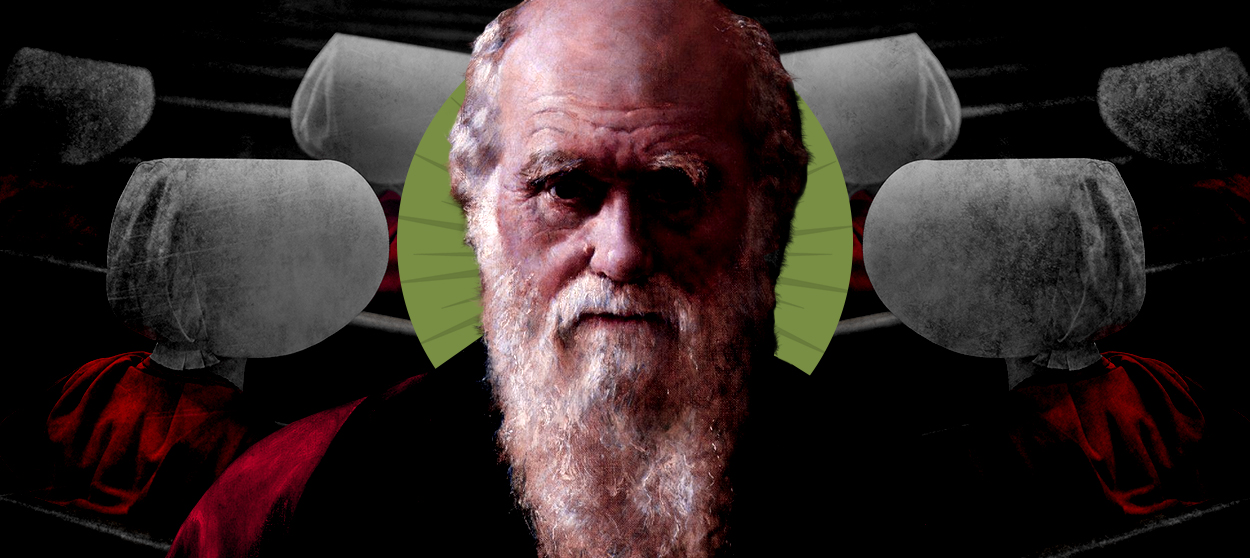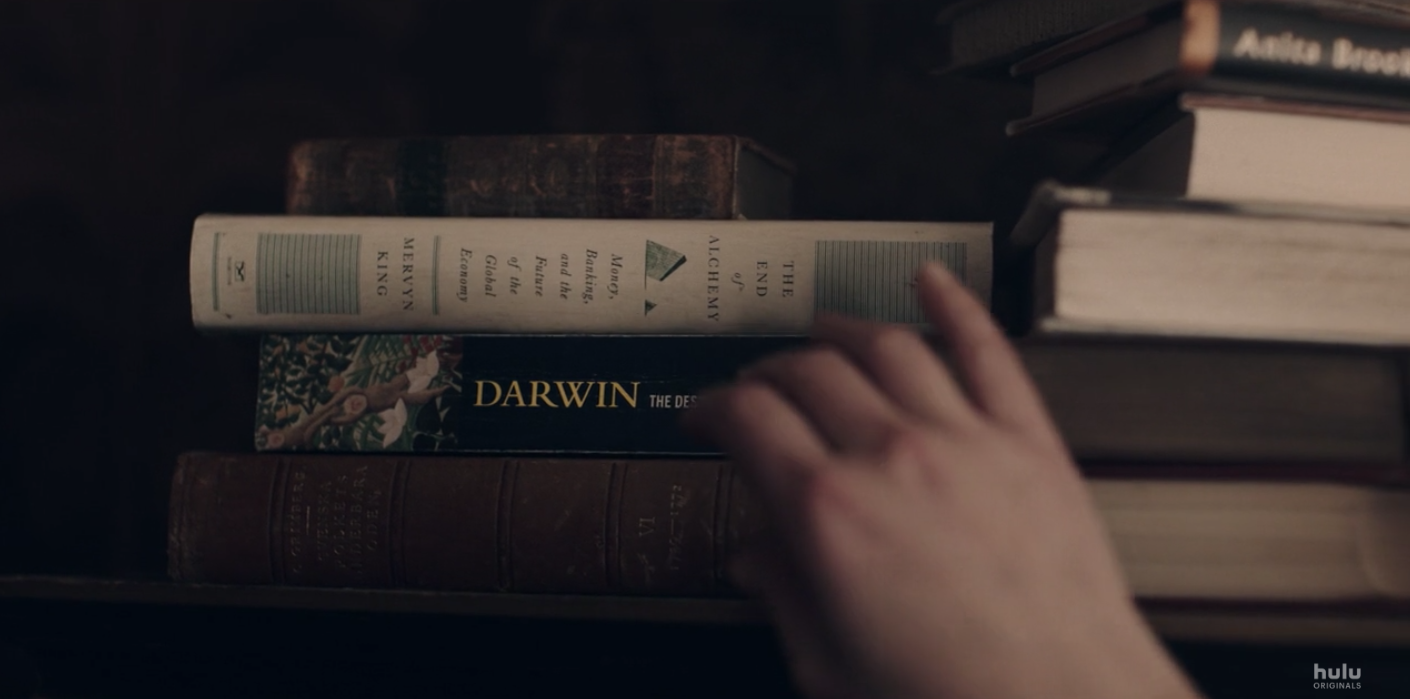Charles Darwin makes a chilling cameo in The Handmaid's Tale's third season
A show with lots to say about religion turns to science


A free daily email with the biggest news stories of the day – and the best features from TheWeek.com
You are now subscribed
Your newsletter sign-up was successful
Since it premiered in 2017, Hulu's The Handmaid's Tale has drawn frequent, and sometimes outlandish, comparisons to life in Trump's America. Now in its third season, though, the story about the dystopic oppression of women in the name of Christian extremism has never been more topical as draconian anti-abortion policies have spread like a rash across America's Bible Belt and beyond, with no end in sight.
The Handmaid's Tale's rooting in religious zealotry is part of what made a scene in "Useful," the third episode of the show's third and final season that was released this week, so chilling. Instead of referencing religion as justification for the sexual enslavement of women, June's new Commander, the economist Joseph Lawrence, asks her to fetch him a book by Charles Darwin to reference in front of his colleagues. The scene, which plays out over several minutes, is excruciatingly tense, even if it doesn't ever get explained why this particular book is so controversial. The moment is also jarring for longtime fans of the show: After all the talk of Bilhah and Martha, all those "praise be's" and "under His eye's," why now a shift to Darwin, seemingly the ideological opposite?

Darwin is of course best known for his 1859 On the Origin of Species, which discusses natural selection as the explanation for variation among all forms of life. A little over 10 years later, though, in 1871, Darwin published another book that would also have long-lasting repercussions, though these would be much more troubling. The Descent of Man and Selection in Relation to Sex — the book June is sent to fetch from the shelf for Commander Lawrence — lays out a theory of woman's inferiority to man under the guise of scientific fact.
The Week
Escape your echo chamber. Get the facts behind the news, plus analysis from multiple perspectives.

Sign up for The Week's Free Newsletters
From our morning news briefing to a weekly Good News Newsletter, get the best of The Week delivered directly to your inbox.
From our morning news briefing to a weekly Good News Newsletter, get the best of The Week delivered directly to your inbox.
During Darwin's time, attitudes in the west about women were beginning to shift and the question of a woman's place in society was more urgent than it had ever been before. With this as his backdrop, Darwin determined that "man is more courageous, pugnacious, and energetic than woman, and has a more inventive genius. His brain is absolutely larger [...]." Darwin took as his evidence that "if two lists were made of the most eminent men and women in poetry, painting, sculpture, music (inclusive both of composition and performance), history, science, and philosophy, with half-a-dozen names under each subject, the two lists would not bear comparison," and made the fateful conclusion: "Man has ultimately become superior to woman."
Darwin's writing would have a major impact on the conception of women as being biologically (and therefore inarguably) less capable than men, despite the fact that the theory faced backlash from feminists almost immediately. Yet in Darwin's eyes, "women were generally subservient and confined to the home," writes Angela Saini, the author of Inferior: How Science Got Women Wrong and the New Research That's Rewriting the Story. "What other reason could there be for this phenomenon but biology?" Darwin had only laid the groundwork: Herbert Spencer, the evolutionary philosopher who coined the phrase "survival of the fittest," would go farther, "postulating that in order for the human race to flourish, women must devote their lives to reproduction," The Smithsonian writes.
Sound familiar? By sending June to fetch The Descent of Man, Commander Lawrence is effectively smearing in her face the centuries-old biological and economic case for the subordination of women (based on June's clinched jaw, she knows exactly what's in the text, too). The terrifying part is, Darwin's obviously flawed argument still exists today as an excuse to keep women out of the workforce, where men are thought by a small but not insignificant few to be better suited. In July 2017, for example, Google engineer James Damore wrote a memo arguing "against efforts to hire more women for engineering and tech jobs without first changing the internal culture of Google to better fit innate biological gender differences."
Other "scientific" studies claiming that men have higher IQs or are otherwise predisposed to be better workers are published with concerning regularity, which in turn undergirds a disturbing resurgence of open misogyny in our politics. Male superiority is the "gateway drug" of the alt-right political movement, the Southern Poverty Law Center writes, adding that the group "misrepresents all women as genetically inferior, manipulative, and stupid and reduces them to their reproductive or sexual function — with sex being something that they owe men [...]."
A free daily email with the biggest news stories of the day – and the best features from TheWeek.com
By referencing Darwin and making The Descent of Man a boiling point for the tensions between June and Commander Lawrence, Hulu's The Handmaid's Tale has once more reconstructed itself to be frighteningly topical. That Gilead's oppression of women is revealed to be not just religious, but based in seductive bunk science, is a disturbing reminder that there is more than one path to dystopia.
Jeva Lange was the executive editor at TheWeek.com. She formerly served as The Week's deputy editor and culture critic. She is also a contributor to Screen Slate, and her writing has appeared in The New York Daily News, The Awl, Vice, and Gothamist, among other publications. Jeva lives in New York City. Follow her on Twitter.
-
 The Olympic timekeepers keeping the Games on track
The Olympic timekeepers keeping the Games on trackUnder the Radar Swiss watchmaking giant Omega has been at the finish line of every Olympic Games for nearly 100 years
-
 Will increasing tensions with Iran boil over into war?
Will increasing tensions with Iran boil over into war?Today’s Big Question President Donald Trump has recently been threatening the country
-
 Corruption: The spy sheikh and the president
Corruption: The spy sheikh and the presidentFeature Trump is at the center of another scandal
-
 The billionaires’ wealth tax: a catastrophe for California?
The billionaires’ wealth tax: a catastrophe for California?Talking Point Peter Thiel and Larry Page preparing to change state residency
-
 Bari Weiss’ ‘60 Minutes’ scandal is about more than one report
Bari Weiss’ ‘60 Minutes’ scandal is about more than one reportIN THE SPOTLIGHT By blocking an approved segment on a controversial prison holding US deportees in El Salvador, the editor-in-chief of CBS News has become the main story
-
 Has Zohran Mamdani shown the Democrats how to win again?
Has Zohran Mamdani shown the Democrats how to win again?Today’s Big Question New York City mayoral election touted as victory for left-wing populists but moderate centrist wins elsewhere present more complex path for Democratic Party
-
 Millions turn out for anti-Trump ‘No Kings’ rallies
Millions turn out for anti-Trump ‘No Kings’ ralliesSpeed Read An estimated 7 million people participated, 2 million more than at the first ‘No Kings’ protest in June
-
 Ghislaine Maxwell: angling for a Trump pardon
Ghislaine Maxwell: angling for a Trump pardonTalking Point Convicted sex trafficker's testimony could shed new light on president's links to Jeffrey Epstein
-
 The last words and final moments of 40 presidents
The last words and final moments of 40 presidentsThe Explainer Some are eloquent quotes worthy of the holders of the highest office in the nation, and others... aren't
-
 The JFK files: the truth at last?
The JFK files: the truth at last?In The Spotlight More than 64,000 previously classified documents relating the 1963 assassination of John F. Kennedy have been released by the Trump administration
-
 'Seriously, not literally': how should the world take Donald Trump?
'Seriously, not literally': how should the world take Donald Trump?Today's big question White House rhetoric and reality look likely to become increasingly blurred
